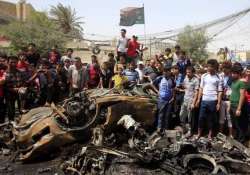Car bombs, shooting in Iraq leave 17 dead
Baghdad, May 16: Car bombs struck Shiite neighborhoods of the Iraqi capital and a northern city on Thursday killing 16 people, while gunmen in Baghdad shot dead the brother of a Sunni lawmaker, officials said.The

Baghdad, May 16: Car bombs struck Shiite neighborhoods of the Iraqi capital and a northern city on Thursday killing 16 people, while gunmen in Baghdad shot dead the brother of a Sunni lawmaker, officials said.
The attacks followed a wave of bombings on Wednesday that also struck in mainly Shiite neighborhoods, killing 33 people and raising concerns over a return to the sectarian bloodshed in Iraq.
Baghdad police said the first of Thursday's bombings hit a bus and taxi stop during the morning rush hour in the city's eastern Sadr City neighborhood. Nine people were killed, including a 7-year-old child, and 16 were wounded in that attack, two officers said.
Another car bomb hit a small market at a taxi stop in Baghdad's eastern suburb of Kamaliya, killing three civilians and injuring 14 others there, the officers said.
And in the capital's northern Chikok district, two civilians were killed and 10 were injured when a car bomb missed a police patrol that was passing through, two other police officers said.
In the northern city of Mosul, a suicide attacker rammed his car into an army check point, killing two soldiers and wounding three others, another police officer said. The attack came just after a car bombing in another area of Mosul wounded two civilians, he said. Mosul is located 360 km (225 miles) northwest of Baghdad.
In Baghdad's southwestern neighborhood of Baiyaa, drive-by gunmen shot and killed a brother of a Sunni lawmaker and wounded two of his guards, two police officials said.
Four medical officials in a nearby hospital confirmed the causality figures. All officials spoke on condition of anonymity because they were not authorised to talk to the media.
The spike in violence comes amid growing tensions between the Shiite-led government and Iraq's Sunni minority over what they consider second-class treatment. A bloody government crackdown on militants last month in a protest camp in the country's north fueled the latest tensions.
Iraq's embattled Shiite Prime Minister Nouri al-Maliki on Thursday blamed sectarian tensions for the latest attacks.
“We have to know that today's bloodshed is the result of sectarian hatred and also the result of a stirring up of these sectarian tensions,” al-Maliki said during a government-organised conference about atrocities committed under dictator Saddam Hussein.
Incitement could be coming from inside or outside the country, al-Maliki added.
No one has claimed responsibility for Wednesday's and Thursday's attacks, but car and suicide bombings are a hallmark of al-Qaida's Iraq branch.
The spike in attacks, after a general decrease in violence, has raised fears of a return to the sectarian bloodshed that pushed Iraq to the brink of civil war in 2006-2007. Shiite militias have so far been largely restrained in their reactions to such bombings.
The attacks followed a wave of bombings on Wednesday that also struck in mainly Shiite neighborhoods, killing 33 people and raising concerns over a return to the sectarian bloodshed in Iraq.
Baghdad police said the first of Thursday's bombings hit a bus and taxi stop during the morning rush hour in the city's eastern Sadr City neighborhood. Nine people were killed, including a 7-year-old child, and 16 were wounded in that attack, two officers said.
Another car bomb hit a small market at a taxi stop in Baghdad's eastern suburb of Kamaliya, killing three civilians and injuring 14 others there, the officers said.
And in the capital's northern Chikok district, two civilians were killed and 10 were injured when a car bomb missed a police patrol that was passing through, two other police officers said.
In the northern city of Mosul, a suicide attacker rammed his car into an army check point, killing two soldiers and wounding three others, another police officer said. The attack came just after a car bombing in another area of Mosul wounded two civilians, he said. Mosul is located 360 km (225 miles) northwest of Baghdad.
In Baghdad's southwestern neighborhood of Baiyaa, drive-by gunmen shot and killed a brother of a Sunni lawmaker and wounded two of his guards, two police officials said.
Four medical officials in a nearby hospital confirmed the causality figures. All officials spoke on condition of anonymity because they were not authorised to talk to the media.
The spike in violence comes amid growing tensions between the Shiite-led government and Iraq's Sunni minority over what they consider second-class treatment. A bloody government crackdown on militants last month in a protest camp in the country's north fueled the latest tensions.
Iraq's embattled Shiite Prime Minister Nouri al-Maliki on Thursday blamed sectarian tensions for the latest attacks.
“We have to know that today's bloodshed is the result of sectarian hatred and also the result of a stirring up of these sectarian tensions,” al-Maliki said during a government-organised conference about atrocities committed under dictator Saddam Hussein.
Incitement could be coming from inside or outside the country, al-Maliki added.
No one has claimed responsibility for Wednesday's and Thursday's attacks, but car and suicide bombings are a hallmark of al-Qaida's Iraq branch.
The spike in attacks, after a general decrease in violence, has raised fears of a return to the sectarian bloodshed that pushed Iraq to the brink of civil war in 2006-2007. Shiite militias have so far been largely restrained in their reactions to such bombings.